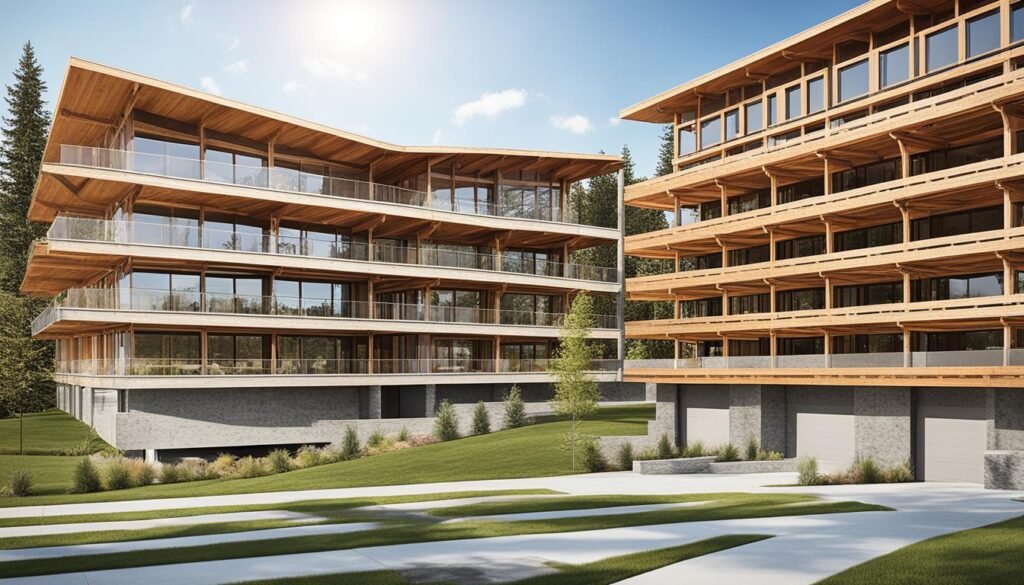Did you know that the choice of building material can significantly impact the cost of your construction project? When it comes to cost, one of the key decisions to make is whether to use wood or concrete as the primary building material. To help you make an informed choice and find the most budget-friendly option, we will compare the cost of wood and concrete, taking into account factors such as material price, installation cost, and long-term maintenance expenses.
- Comparing the cost of wood and concrete can help you determine the most affordable option for your building project.
- Consider factors such as material price, installation cost, and long-term maintenance expenses when assessing the overall cost.
- Wood may be initially cheaper but may require more maintenance and have a shorter lifespan compared to concrete.
- Concrete is known for its durability and longevity but comes with a higher upfront cost.
- Consulting with professionals and gathering detailed cost estimates is recommended before making a final decision.
When deciding between wood and concrete for your building project, there are several factors to consider. Firstly, you need to compare the cost of both materials, including the price per square foot and any additional expenses such as installation and maintenance.
Secondly, consider the durability of each material. While wood may require more frequent maintenance and have a shorter lifespan, concrete is known for its longevity and resistance to wear and tear. However, it is important to note that wood can be treated to increase its durability and lifespan.
Additionally, consider the potential environmental impact of each material. Wood is a renewable resource, but it may contribute to deforestation if not sourced sustainably. Concrete production has a significant carbon footprint and may not be as environmentally friendly.

“When it comes to building a house, cost is a major consideration for many homeowners.”
By evaluating these factors, you can make an informed decision that takes into account cost, durability, maintenance expenses, and environmental impact. It’s important to weigh the pros and cons of each material and choose the option that best aligns with your specific needs and budget.
Conclusion
In conclusion, when choosing between wood and concrete for your building project, it is important to carefully consider various factors, such as cost, durability, and environmental impact. While wood may initially offer a lower price point and greater design flexibility, it typically requires more maintenance and has a shorter lifespan compared to concrete. On the other hand, concrete is known for its durability and longevity, albeit with a higher upfront cost.
Ultimately, the decision should be based on your specific needs, budget, and long-term goals. If budget is a primary concern and you prioritize lower upfront costs, wood may be the more budget-friendly option for you. However, if you value long-term durability and minimal maintenance, concrete may be the better choice, despite the initial expense.
It is recommended to consult with professionals, such as architects or contractors, and gather detailed cost estimates before making a final decision. They can provide invaluable insight and help you navigate the complexities of wood vs concrete cost analysis. By thoroughly considering all the factors and weighing the pros and cons of each material, you can make an informed choice and find the most suitable and budget-friendly option for your building project.
FAQ
Is wood or concrete cheaper for building a house?
Determining which material is cheaper depends on various factors such as material price, installation cost, and long-term maintenance expenses.
What factors should I consider when choosing between wood and concrete?
When deciding between wood and concrete, factors to consider include cost, durability, and environmental impact.
How does the cost of wood compare to concrete?
The cost of wood and concrete can vary, including the price per square foot, as well as any additional expenses related to installation and maintenance.
What is the durability of wood compared to concrete?
Wood may require more frequent maintenance and have a shorter lifespan compared to the longevity and resistance to wear and tear of concrete.
What about the environmental impact of wood and concrete?
Wood is a renewable resource but may contribute to deforestation if not sourced sustainably. Concrete production has a significant carbon footprint.
How should I make the final decision between wood and concrete?
The decision should be based on your specific needs, budget, and long-term goals. It is recommended to consult with professionals and gather detailed cost estimates before making a final decision.